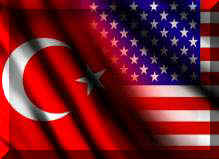By Rudaw
ERBIL, Kurdistan Region – Relations between Ankara and Washington have hit a new roadblock over Turkey’s military operation in Afrin, while Russia has accused western nations of exploiting the Kurds.
Turkey’s Foreign Minister Mevlut Cavusoglu had claimed that US Secretary of State Rex Tillerson had pitched establishing a 30 kilometre-deep safe zone in Afrin, state-run Anadolu Agency reported on Wednesday.
Asked about the proposal by media in Davos, Tillerson denied the report.
“No, we discussed a number of possible options but we didn’t propose anything,” he said, according to the Washington Post.
A Pentagon spokesperson clarified that they continue to hold talks with Turkey “about the possibility of a secure zone.”
“We’ve looked at that for a couple of years in various different iterations and no final decision on it yet. Our military commanders are still talking to I would say it’s a concept that’s out there… it’s simply an idea that’s floating around right now,” Lieutenant General Kenneth McKenzie told reporters on Thursday.
Cavusoglu on Thursday said “we have to re-establish trust.”
“I have previously clearly explained why we do not have trust: shipment of weapons to YPG, and the non-fulfilment of USA promises after Manbij, and lately Mr Trump said we will not give weapons to YPG, even in the last night’s phone call he said ‘We will no longer give [weapons to YPG],’” he said in a press conference.
US President Donald Trump spoke by phone with Turkish President Recep Tayyip Erdogan on Wednesday and said he understood Turkey’s security concerns, but warned against taking steps that could risk military conflict between US and Turkish forces in Syria. He also urged the Turkish leader to limit the operation and civilian casualties.
‘Serious trust issues’
State Department Spokesperson Heather Nauert said on Thursday that Trump was tough with Erdogan, during their call.
The readout of their conversation from the White House did not mention arming the Kurdish forces, YPG, but did say that Trump expressed concerns about the violence and “destructive and false rhetoric coming from Turkey.” It did not elaborate on that rhetoric.
Trump did say he was open to closer cooperation “to address Turkey’s legitimate security concerns,” the White House stated.
Erdogan’s office said the Turkish leader urged Trump in the phone call to halt the US supply of weapons to the Syrian Kurdish militia.
Reacting to Trump’s warning, Bekir Bozdag, spokesperson for Erdogan, told Turkey’s A Haber TV, “We do not need advice, we need action.”
“Suspension of the Olive Branch operation is non-negotiable because there are serious trust issues between the United States and Turkey. The promises given to us are different from what is done on the ground,” Bozdag said.
The United States has armed the YPG under the umbrella of the SDF as part of the war against ISIS in northern Syria. Ankara considers the Kurdish forces extensions of the PKK, a named terror organization, and has routinely complained of the US’ alliance with the force.
Bozdag said that Turkey may not be able to differentiate between American and Kurdish forces in Syria.
“Those who are alongside the terrorists and fight with weapons with them and provide them with artillery will be targeted,” he threatened.
Playing the ‘Kurdish card’
Russia, which has repeatedly expressed support for Syrian Kurdish groups despite Turkey’s objections, believes that Turkey’s interests in the country may not be compatible with those of Russia.
“We discussed the problems with Turkey. Kurds should be part of the political process,” Foreign Ministry Spokesperson Maria Zakharova said on Thursday, commenting on Russia’s stance on the latest developments in Afrin, responding to a question from Rudaw correspondent Khalid Hussein.
“In the past, Russian representatives tried to make Kurds participate in the political stability,” she said.
Kurdish leaders within the ruling parties in Rojava had said they were invited to Russia’s Sochi congress bringing together some 1,600 participants to discuss a political resolution to Syria’s conflict. The congress is co-hosted by Turkey and Iran.
Though Kurdish leaders later said they had not received a formal invitation, they said they would not attend after Russia tacitly gave Turkey a greenlight for the Afrin operation when it withdrew forces from Afrin.
Zakharova denied Russia’s stance towards Afrin was contradictory, saying: “Our Western partners worked continuously in the Kurdish issue, but it was not for the advantage of the Kurds.”
“The Western countries played the Kurdish card and exploited them when they were needed,” she added.
Moscow is a key backer of Syrian President Bashar al-Assad, who the leadership of Afrin on Thursday called on to do his “duty” and protect Afrin’s borders from Turkey.









